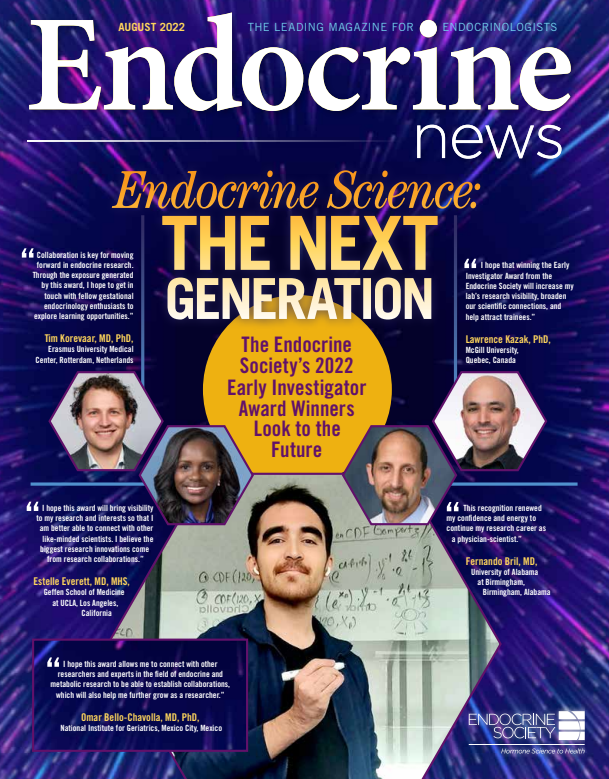Purpose: To support and recognize accomplishments of early-career investigators in general endocrinology.
Benefits: $1,500 Travel Grant, complimentary ENDO registration, a one-year society membership, and public recognition.
Requirements: Recipients must present at a special session at ENDO and may need to write an article for Endocrine News or volunteer for the Society.
Please note: this is a one-year award payment increase for 2026.
We are no longer accepting applications for the 2026 EIA Award.
Eligibility Criteria
For questions contact [email protected].
We are no longer accepting applications for the 2026 EIA Award.Apply to EIA

| Recipient | Background |
|---|---|
|
Muriel Babey, MD |
Dr. Babey completed medical training at the University of Berne in Switzerland and continued at UCSF, where she joined the Ingraham Lab in 2020. Her research explores how the brain regulates bone health during aging and metabolic stress. She helped identify CCN3, a brain-derived, bone-building hormone from arcuate Kiss1 neurons active during lactation. With support from a K08 award, Dr. Babey is investigating CCN3’s role in bone and marrow fat metabolism, aiming to uncover endocrine pathways that drive metabolic decline in postmenopausal women and identify new therapeutic targets. |
|
Hironori Bando, MD, PhD |
Dr. Bando graduated from Osaka Medical College, now known as Osaka Medical and Pharmaceutical University, in 2007 and subsequently commenced his residency at Kobe University Hospital. After completing his senior residency, he began a doctoral program specializing in endocrinology. Between 2018 and 2020, he served as a research fellow in Human Genetics at the University of Michigan. In 2020, he was appointed assistant professor in the Department of Diabetes and Endocrinology at Kobe University. Throughout his career, his research has predominantly centered on pituitary insufficiency. |
|
Pedro Marques, MD, PhD |
Dr Marques is an endocrinologist at CUF Descobertas Hospital, and an assistant professor and researcher at the Medical Faculty of Universidade Católica Portuguesa and at the Leiden University Medical Center (LUMC). He is also the vice-president of the Portuguese Endocrine Society (SPEDM). After completing his PhD in 2020 at Prof. Korbonits’ lab in London, Dr Marques established his lab in Lisbon to further study the microenvironment of pituitary tumors. His main research interests concern pituitary and neuroendocrinology, in particular the pituitary tumor microenvironment, genetics of pituitary tumors and pseudo acromegaly. |
|
Dequina Nicholas, PhD |
Dr. Dequina Nicholas received her Ph.D. in biochemistry from Loma Linda University and completed postdoctoral training at Boston University in Dr. Barbara Nikolajczyk’s lab, studying immune cell metabolism in type 2 diabetes. She also trained with Drs. Mark Lawson and Pamela Mellon, where she identified novel pituitary immune cells and explored glucose metabolism’s impact on reproduction. Now an Assistant Professor at UC Irvine, Dr. Nicholas leads research at the intersection of immunology, nutrition, and endocrine disease. Her lab aims to uncover the roots of chronic inflammation and develop immune-based therapies, supported by NIH NICHD and Director’s New Innovator Awards. |
|
Matthew Taves, PhD |
Matt Taves completed his PhD at the University of British Columbia and worked at the National Cancer Institute and Cornell University before beginning as at Assistant Professor at the University of Illinois Urbana-Champaign. His work focuses on systemic and cell-specific glucocorticoid control of immunity, especially in T lymphocyte development and anti-tumor immunity. When outside of the lab he enjoys spending time with family, being active outdoors, and playing dungeons and dragons. |
|
Recipient |
Background |
|
Leen Antonio, MD, PhD |
Dr. Antonio is an endocrinologist/andrologist at University Hospitals Leuven, Belgium, and an assistant professor in the Department of Chronic Diseases and Metabolism (CHROMETA) of KU Leuven, Belgium. Her research interests include male hypogonadism, male infertility and pituitary disorders. She leads clinical research projects in andrology, male reproductive endocrinology and steroid hormones. |
|
Kleiton Borges, PhD |
Dr. Borges is an instructor in pediatrics at Boston Children’s Hospital and Harvard Medical School with over 15 years of experience in cancer biology. His general research focus is the understanding of the cellular and molecular basis of adrenocortical tissue homeostasis and tumor development. His main research program applies functional genomics to improve the understanding of adrenocortical carcinoma (ACC) immunology using genetically engineered mouse models that closely recapitulate the human ACC tumor. |
|
Maria Camilletti, PhD |
Dr. Camilletti is a research assistant currently working in the Faculty of Exact and Natural Sciences, at the University of Buenos Aires (FCEyN-UBA) and in the Institute of Neurosciences (INEU, FLENI, Escobar). Her research focuses on the molecular mechanisms of pituitary development and the identification of the genetic cause of hormonal deficiencies. |
|
Cintia Citterio, PhD |
Dr. Citterio is an assistant professor of biomedical sciences who teaches molecular biology and genetics to pharmacy and graduate students. She has mentored, advised or co-advised several interns, undergraduate and graduate students on their research projects. Citterio's research focuses on the molecular mechanisms leading to thyroid disorders and the biochemistry behind thyroid hormone formation with the goal of understanding the molecular basis of disease to improve diagnosis and treatment. |
|
Francesca Galbiati, MD |
Dr. Galbiati is a fourth-year clinical research fellow in the Division of Endocrinology, Diabetes and Hypertension at Brigham and Women's Hospital. She went to medical school at the Università degli Studi di Milano Bicocca Facoltà di Medicina e Chirurgia in Monza, Italy, and did her residency at the University of Pittsburgh Medical Center in Pittsburgh, Pennsylvania. |
| Recipient | Background |
|---|---|
|
Kotaro Sasaki, M.D., Ph.D., of the University of Pennsylvania in Philadelphia, Penn. |
Dr. Sasaki is an assistant professor in the Department of Biomedical Sciences at the University of Pennsylvania School of Veterinary Medicine and of Laboratory Medicine at the University of Pennsylvania Perelman School of Medicine. Sasaki’s research is focused on the development of human germline and urogenital organs. His lab’s research discoveries help lay the foundation for understanding the molecular basis of human infertility, reproduction and endocrinology. |
|
Louise Gregory, Ph.D., of University College London Great Ormond Street Institute of Child Health (ICH) in London, U.K. |
Dr. Gregory is a postdoctoral research scientist at ICH in genetics and genomic medicine, where she is continuing her research into congenital hypopituitarism and related disorders. She is currently investigating novel genes and pathways associated with congenital hypopituitarism, identified through next generation sequencing of her team’s patient cohort. |
|
Laura Hernandez-Ramirez, M.D., Ph.D., of the National Autonomous University of Mexico in Mexico City, Mexico |
As an associate researcher at her university, Dr. Hernandez-Ramirez focuses on translational research in neuroendocrinology and human genetics. Her lab seeks to develop platforms for affordable genetic testing to identify the type, frequency and associated outcomes of multiple genetic drivers, and to uncover potential therapeutic targets. |
|
Michael Kalwat, Ph.D., of the Indiana Biosciences Research Institute in Indianapolis, Ind. |
Dr. Kalwat is an assistant investigator in the Lilly Diabetes Center of Excellence within the Indiana Biosciences Research Institute's Diabetes Center and a member of the Indiana University School of Medicine's Center for Diabetes and Metabolic Diseases. Kalwat investigates the molecular mechanisms of regulated secretion and the use of genetic and pharmacological tools for this purpose. His lab bridges small molecule and genetic high-throughput screening with target and pathway identification in dedicated secretory cell types. |
|
Peter van Dijk, M.D., Ph.D., of The University Medical Center Groningen (UMCG) in Groningen, The Netherlands |
Dr. van Dijk is a clinical academic endocrinologist who specializes in diabetes and general endocrinology. He is passionate about creating customized treatment plans that are focused on his patients’ specific well-being and quality of life. In addition to providing the best care to his patients, he conducts research focused on diabetes mellitus and innovations in technology that advance the treatment of type 1 diabetes. |
2022
|
Recipient |
Institution |
|
Omar Bello-Chavolla |
Instituto Nacional de Geriatría |
|
Fernando Bril |
University of Alabama at Birmingham |
|
Lawrence Kazak |
McGill University |
|
Estelle Everett |
University of California Los Angeles |
|
Tim Korevaar |
Erasmus MC |
| Recipient | Institution |
|---|---|
| Himanshu Arora | University of Miami |
| Ana Aulinas | Hospital de Sant Pau |
| Athanasios Bikas | Brigham and Women's Hospital |
| Juan Brito | Mayo Clinic |
| Manuel D. Gahete | University of Cordoba |
| Recipient | Institution |
|---|---|
| Mehmet Furkan Burak | Harvard School of Public Health |
| Dionysios Chartoumpekis | Lausanne University Hospital |
| Hisham Mohammed | University OF ADELAIDE |
| Hongxia Ren | Indiana University |
| Domenico Trico | University of Pisa |

Every year the Endocrine Society recognizes endocrinologists who are in the early stages of their research careers with the Early Investigator Awards. Endocrine News spoke to the five researchers from around the world to find out more about their award-winning research, the award’s potential impact, as well as the biggest challenges facing them today.

Join our endocrine community and become a member! Only members receive access to a variety of member benefits that will enhance your career. If your membership has lapsed, rejoin today so that you can continue to receive your membership benefits.